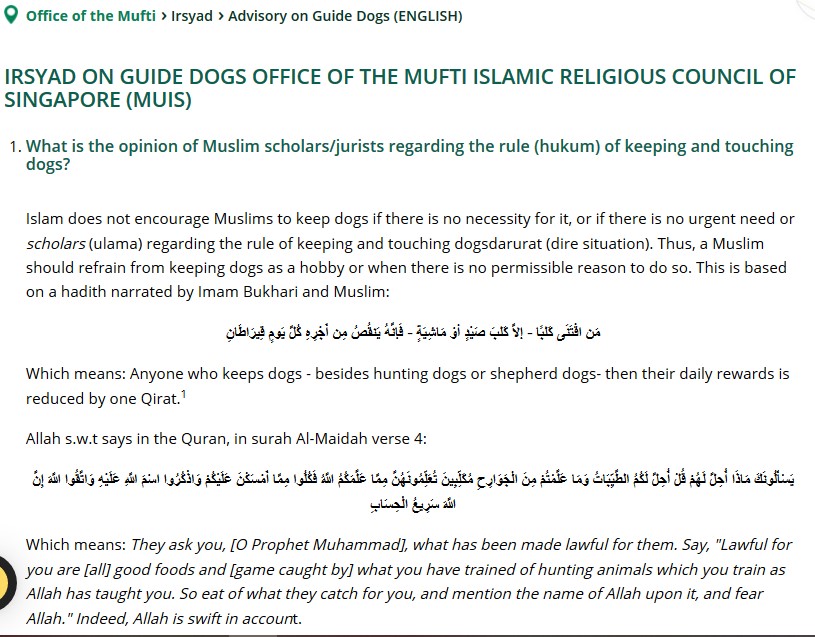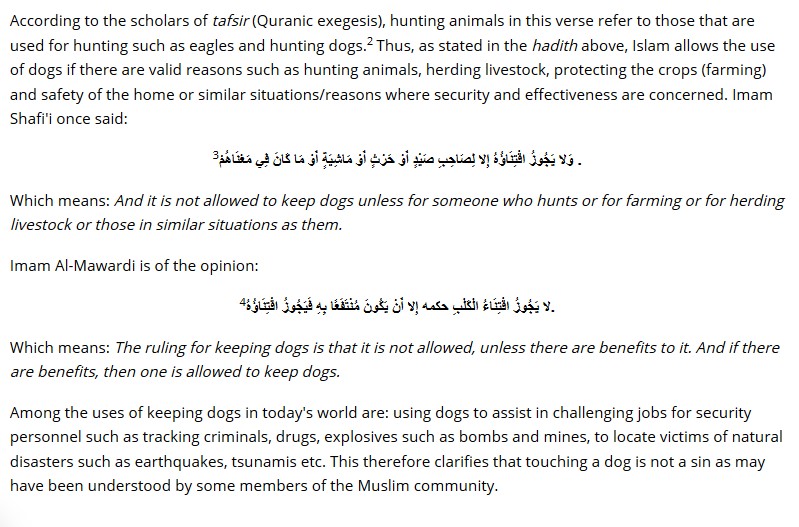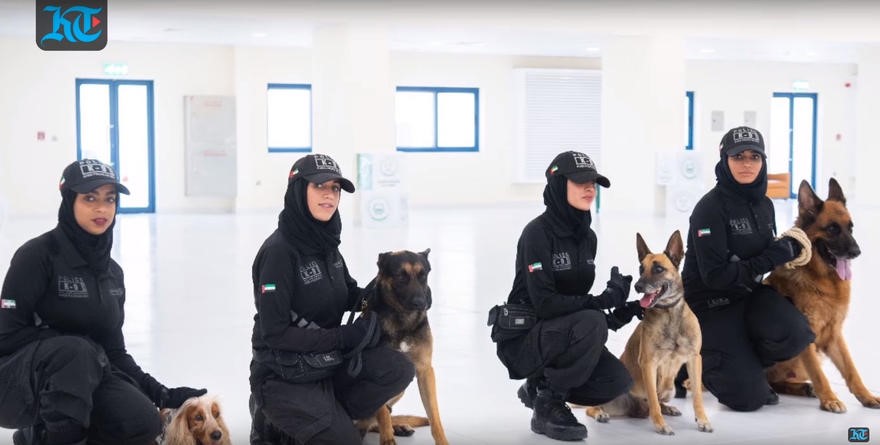This article was published in Wasat, no. 34/July 2020 which can be accessed here.
By Ustaz Muhammad Haniff Hassan
A Malay Muslim person posted his dilemma on Internet about his immediate family members’ negative reactions and attitudes towards his job as a police officer in dog unit. They consider his job as haram (forbidden) and the salary that he got from it is impure. The post had invited controversy among netizens.
Some of the comments raised concerns because it highlights a misunderstanding of Islamic rulings on the matter. If left uncorrected, it would remain in the society and spread to others. The misunderstanding could also then be manifested in unkind behavior that would cause negative perceptions among non-Muslims towards Islam and Muslims.
Some of the misunderstanding are as follow:
a) the idea of serving in a police dog unit is impermissible (haram) for a Muslim officer because dogs are impure (najis) and this would affect a Muslim’s personal cleanliness and his or her subsequent act of worship (ibadah),
b) dog is an inauspicious animal for Muslims to be in close contact with,
c) a dog’s presence prevents the coming of angels tasked to bring divine blessings.
Unkind behaviours could be in the form of nasty comments, online harassments and social boycott because the serving officer is regarded to have committed a grave sin and has compromised Islamic teachings which puts his religious integrity into question.
This article’s primary objective seeks to correct some misunderstandings on the topic. Its objective is not to normalise close contact between Muslims and dogs, which is culturally frowned upon in a Malay Muslim community. The article also does not seek to offer a fatwa justifying the decision to make Muslim officers serve in dog units of security agencies.
The writer recognises that respecting and being sensitive to local societal norms and culture is a must for Muslims. However, this should not lead to misunderstandings of the religion itself and wrongful application of its rulings which would cause unkind behaviours and unjustified allegations towards a fellow Muslim’s integrity to be made.
Serving in a dog unit
It is permissible for Muslims to serve in and be part of a dog unit belonging to local security agencies such as the police, military, customs and prison service.
Muslim scholars since the classical period have ruled for the permissibility of using dogs to protect houses and farm from criminals and wild animals. The most cited dalil is from 5:4 of the Qur’an which mentions and, thus, permits the use of dogs for hunting.
The verse was revealed to the Arab people during the time where hunting was no more their primary means of food and survival. Then, Arabs were not a hunting society anymore. They had become an agricultural and trading society. Thus, hunting merely became a recreational activity and a supplementary source of food.
If the use of dogs for hunting for a non-dharuri (essential) purpose is permissible, then its use for security protection of individual and personal property should take the same ruling too, according to Muslim scholars. It is logical then to deduce that the use of dogs for the protection of public security and property is more critical and should be permissible too. Furthermore, the efficiency of dogs for this function have been recognised by experts and tested. It is also a current practice in security fields all over the world.
This argument could be supported by the fact that security forces in Muslim countries operate dog units which are handled by Muslim officers and local Muslim scholars are not known to have spoken against it.
As such, the issue of angels staying away from dog-handling Muslims does not materialize because it happens for reasons that are recognised by the shari`ah.
Impurity of dog
Firstly, a dog’s status as an impurity is not a principle religious issue. It falls under a contentious issue among Muslim scholars.
The Shafi`ites, the dominant mazhab in this region, and the Hanbalites rule that a dog’s whole body is impure.
The Hanafites, however, rule that only a dog’s mouth, saliva and waste are impure. The other parts of its body are not.
These three mazhabs do not regard the touching of a dog as haram. They do not differentiate between a dog and other impurities such as urine, poop and carrion. All are impurities that must be cleansed from one’s body and clothes but touching or being stained by them is not considered haram.
Some Malikites hold an opinion that dogs are not impure at all. They regard the Prophet’s command to perform special washing (six washes with water and one wash with a mix of earth and water) to anything in contact with dogs as a matter of “ta`abbudi” (pure devotional obedience), not because of dogs’ impure status).
Cleansing dog’s impurity
The Shafi`ites, Hanafites and Hanbalites agree that cleansing a dog’s impurity must be done with the special washing stipulated by the Prophet.
The Hanbalites hold a slightly different view. They allow the use of soap as an alternative to earth mixed with water. Thus, the impurity could be cleansed with one washing with soap and six more with water or by allowing tap water equivalent to the amount of six washes to flow (i.e six small dippers of water).
The Malikites who view that dog is not impure hold the view that the special cleansing recommended by the Prophet is not obligatory.
Based on this, the available options for Muslims when in contact with dog before performing their prayers are;
- to perform the original cleansing ritual based on the Shafi`ites and Hanafites. This could be made easier with the use of special soap as a modern alternative to earth mixed with water which is available in the markets
- to perform the cleansing ritual based on the Hanbalites which is the use of normal soap as alternative to soil mixed water
- non-obligatory normal wash for hygiene reason based on the Malikites, except when in contact with a dog’s urine or waste. In such a case, obligatory but normal wash would suffice.
When ranked in accordance to hardship and difficulty, the first option will be the most challenging. Although the second option is less troublesome, it may not be practical because it necessitates changing of one’s uniform every time a Muslim wants to perform prayer and this may not be possible when he is working outside his base.
Obviously, the least troublesome and most practical option is the third. For this reason, many contemporary Muslim scholars recommend the adoption of this view in such a situation because it suits the character of Islam that is easy and practical.
Adopting opinions from other mazhabs
It is the right of a Muslim to continue with the opinion of the Shafi`ite mazhab on the issue discussed in this article. For other Muslims, it may be difficult to practice the opinion, but not difficult for him or he is prepared to bear the hardship.
However, the right of other individuals to choose the less difficult opinion from other mazhabs must also be respected.
Often, the allowance for other Muslims to adopt opinions from other mazhab is seen suspiciously as an attempt to challenge the existing dominance of the Shafi`ite mazhab among Malays here and to replace it with a mazhab-free orientation often associated with the Kaum Muda movement or Wahabis.
However, this is a misconception that must be corrected. Adopting opinions of other mazhabs as a more practical solution for specific issue or problem has been practiced by Muslim community for very long time. Some examples are;
- the use of money for payment of zakat fitrah, as an alternative to the use of rice, the use of mathematical calculation (hisab) in determining the beginning and end of Ramadan, as an alternative to the use of ru’yah (visual sighting of moon)
- the adoption of the Hanafite opinion, for haj and umrah pilgrims, that wudhu’ does not become void due to bodily contact between non-mahram male and female, as an alternative to the contrasting view taken up by the the Shafi`ites.
These examples have long been practiced by Muslim community in Singapore without altering the long held tradition of the Shafi`ite mazhab among Malays.
Recommending the Malikite opinion as a solution for the specific issue discussed here is no different from the above examples.
Conclusion
It is not haram for Muslims to serve in the police dog unit, be it by his choice or order by the authority. Thus, the serving Muslim officer should not be condemned or ostracised.
Admittedly, it is important for Muslim to respect the community’s traditions and norms and to be sensitive with their sensitivities such as practices that are culturally regarded taboo by Malays. However, this should not lead to one judging another person with a wrong rule in the name of Islam such as wrongly ruling a person as having committed a sinful act or prejudicing him as one who has neglected his religious duties or questioning his religious integrity.
Finally, what is discussed in this article could also be applied to Muslims who wish to be professional veterinarians because it may be difficult, in Singapore context, for such Muslims to avoid treating dogs – an act that is regarded noble in Islam too.
————————————————-




